‘I can wfh – work from hospital’: What working caregivers in Singapore want you to know about their struggles
More working adults are taking on the responsibilities of caring for their dependent family members. Despite strides made in recent years to alleviate their burdens, they say that more can be done to offer much-needed relief.
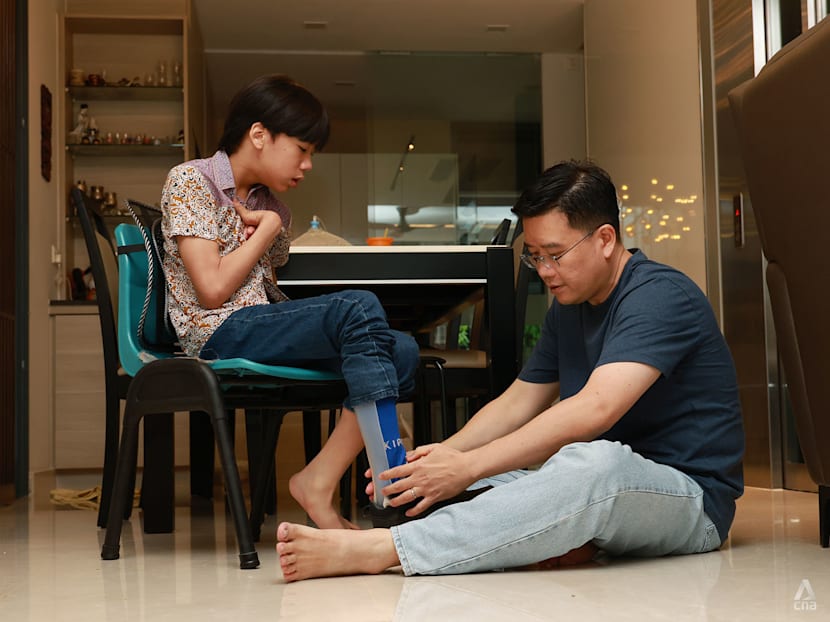
Mr Gabriel Lee (right), 48, gave up his job roles in engineering that required more travel, so that he can care for his 14-year-old son Bryan who has cerebral palsy. (Photo: CNA/Raj Nadarajan)

This audio is generated by an AI tool.
On paper, Ms Jacqueline Ang has only one employer, a university.
In reality, the 49-year-old holds two full-time jobs: technical manager as well as primary caregiver to her 23-year-old twin daughters with autism, her 16-year-old youngest daughter and her 75-year-old mother-in-law who lives with the family.
At 5.30am every weekday, she is up to prepare for the day and two hours later, she is out of her Jurong West flat to Sengkang to drop off one of the twins at a day activity centre. There were no available slots at centres nearer home and the other twin who has greater care needs did not qualify for a place.
After that, Ms Ang spends another hour or more making the journey back west to her office in Clementi or to work from home.
Once her packed workday ends, caregiving duties await: driving her daughters to Special Olympics training, helping them with their daily needs and preparing for the routine to start again the next morning.
Even though she has two domestic workers to help manage household chores and fetch her daughter home from Sengkang, the bulk of the caregiving falls squarely on Ms Ang.
Her already overloaded schedule got even more fraught in September last year when her husband suffered a stroke.
He was hospitalised for three months and once home, he needed close care and frequent medical check-ups. He has since regained strength and returned to work, starting with lighter duties.
Ms Ang said: "Last year, after my husband's stroke, I was shaking my head and saying, 'Jialat ("tough" in Hokkien), I'm a caregiver for four (persons with) special needs – my two older twins, my husband who had a stroke and my mother-in-law'."
As Singapore approaches being a "super-aged" society and the retirement and re-employment ages are being raised, more Singaporeans may soon find themselves in the same boat as Ms Ang – forced to balance their work and careers with mounting caregiving and work responsibilities.
A 2022 National Council of Social Service (NCSS) study found that around 46.3 per cent of caregivers in Singapore were engaged in full-time employment.
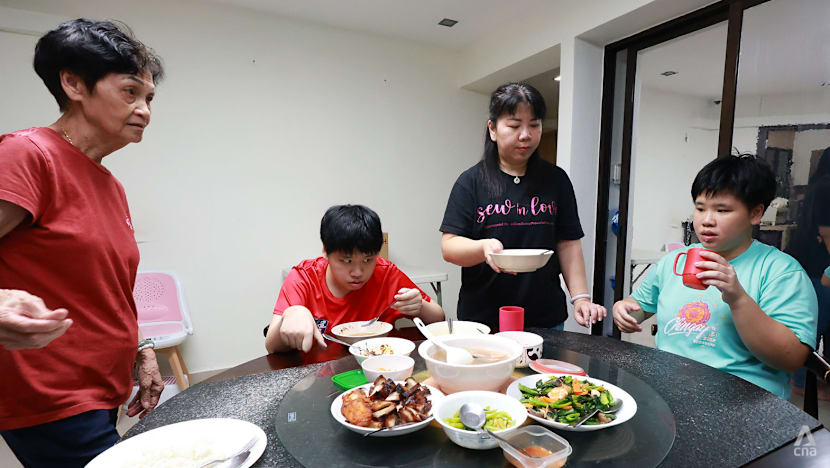
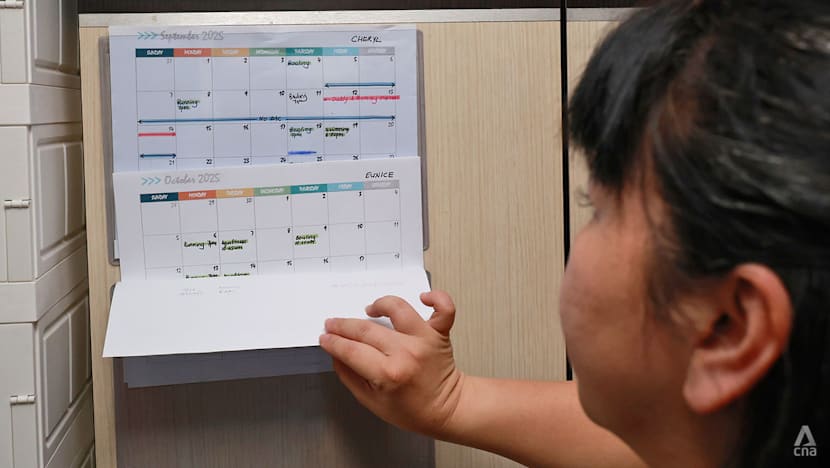
Mr Chris Lim, communications manager from Caring SG, a registered charity aimed at supporting caregivers of people with special needs, said that a "relatively large proportion" of their membership sign-ups since its founding in 2020 comprise 30- to 50-year-olds, many of whom are likely to be in the workforce.
"We've observed more caregivers in this group juggling paid work with caring for dependents with special needs and, in some cases, ageing parents (as well)," he added.
"This profile appears to be increasingly common, particularly among younger caregivers still early in their careers."
Dr Millie Su Yun, a senior lecturer with the SR Nathan School of Human Development at the Singapore University of Social Sciences (SUSS), said that the government is also encouraging ageing in place. Hospitals may also be "much more inclined" to discharge patients to the community, situating caregiving in the family.
"If you consider these macro, socio-economic level factors, caregiving is going to be a very prevalent trend moving forward," Dr Su added.
Against the backdrop of an ageing population, there have been strides in recent years to help mitigate the costs of informal caregiving, including the Home Caregiving Grant.
Even so, social service agencies said that this growing demographic of full-time working caregivers faces unique challenges that are not always adequately addressed.
WHEN CAREER MEETS CAREGIVING
For many working adults, being a caregiver is rarely a planned decision, but a responsibility often thrust upon them when family members have a disability or long-term illness or become less mobile due to age.
Caregiving seldom respects office hours: Doctor appointments and emergencies collide with the nine-to-five, and the fatigue from long nights erodes performance by day. This means it's common for caregivers to find themselves stepping back from the careers they loved – taking breaks, shifting to part-time work or changing industries – as their professional lives warp around someone else's needs.
Notwithstanding the heavy burdens of caregiving, eight working caregivers told CNA TODAY that employment is essential both for income and a sense of purpose.
What enables Ms Ang to balance her day job with her caregiving load has been the support at work, for instance, meetings scheduled later in the morning to give her enough travel time.
"My colleagues came to visit me when my husband first had a stroke and went into a coma," she recalled. "I told my boss, 'Please don't take away my projects. I can always WFH – work from hospital. Don't take away my projects, because I need the money'."
For Ms Faiza Sanip, 56, having to quit her management position overnight to look after her now 30-year-old son who has schizophrenia was "very challenging". Someone who suffers from this serious mental illness requires close supervision to ensure medication is taken regularly, among other things.
"At the time, I was almost 50 and I was having an identity crisis," Ms Faiza said. "I was managing a department and had staff members under me, but it was very clear that as a caregiver, I could not handle that kind of stress anymore and work concurrently."
She later returned to the workforce after her son's condition improved and she is now a programme manager at a charity, Mindfull Community, which offers flexi-work arrangements.
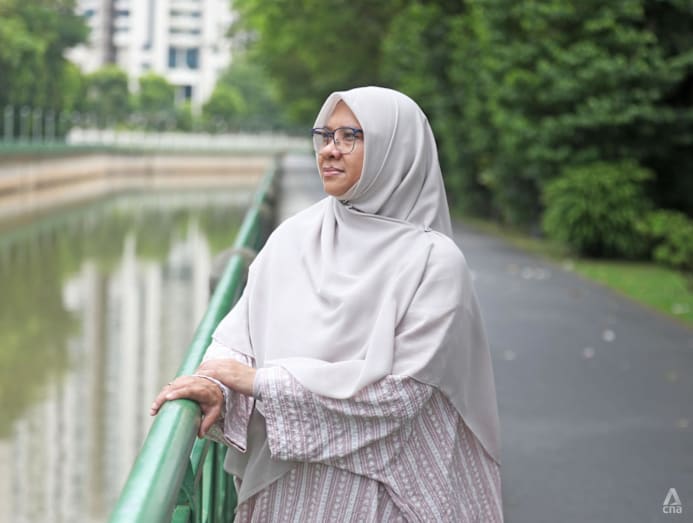
Other caregivers may find it a little easier to roll with the punches.
Mr Anand Lal, 55, who cares for his son with an intellectual disability, left a project management career at its peak. He is now a swim coach, focusing mostly on coaching children with special needs, while also working part-time at St Andrew's Autism Centre.
"We were hitting a point where outsourcing care was not going to be sufficient. (Our son) needed the family support," Mr Anand said.
"It was scary for me and difficult emotionally, because losing that breadwinner and income status was quite a tremendous hit for me."
Mr Anand still sometimes wonders "how much better" his career could have been, but he finds his job "a lot more fulfilling" now.
"I'm adapting every day, but there's a transformation (for me), knowing I'm able to see a smile on a child's face and do something for the community."
In the case of Mr Gabriel Lee, 48, caregiving meant giving up an engineering role that once took him on regular trips overseas. However, as his now 14-year-old son with cerebral palsy grew older and heavier, it became harder for his wife to carry him when Mr Lee was not around.
During the COVID-19 pandemic, he switched to a Singapore-based role, leaving behind his jet-setting lifestyle. He described hearing about ex-colleagues travelling for work as a bittersweet feeling.
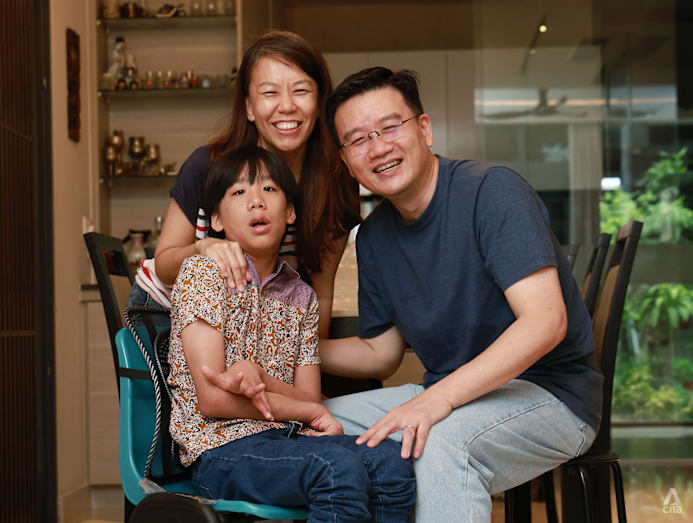
Mindfull Community, where Ms Faiza now works, has seen many similar cases. Its chief executive officer Tim Oei noted that of the more than 21,000 caregivers who attended its programmes last year, 73 per cent were aged 41 to 70, and around 72 per cent were women.
He said: "In this age range, they are likely to be 'sandwiched', having to care for both their young and old in the family. Many have had to stop work, pivot careers or change to part-time work to manage their responsibilities at home."
BURNOUT, NEGATIVE HOME LIFE
For working caregivers, the office is not the only place where compromises must be made. At home, the demands of care are relentless and often invisible to outsiders.
Ms Faiza recalled being hospitalised for a day in 2019 from burnout due to high blood pressure and lack of quality sleep. This was during the first three years of round-the-clock care for her son, who needed constant encouragement to bathe and eat, as well as frequent medical appointments, therapy and rehabilitation.
"I wasn't getting enough sleep ... I'm the driver, I'm the cook, all the domestic help. But after a few years of doing that, I was burnt out.
"My husband and I decided we needed extra help, so we hired a domestic worker to do more of the housekeeping."
On this arrangement of hiring a domestic worker, Mr Lee whose son has cerebral palsy pointed out that it is not always realistic when the task is to care specifically for a family member in need.
Many domestic workers are not trained for the complex needs of looking after people with disabilities, for example, and expecting them to take on that role can be difficult for both the worker and the family.
The family had hired nearly 10 domestic workers in the course of 14 years.
"I have the mindset that this is my child, it's my responsibility and I shouldn't be swapping it out to someone else," he said. "Of course, during work hours, we need someone to take care (of our son), but once we're back home, the helper is hands off."
Handling volatile emotions at home also weighs on caregivers.
Ms Janet Yeo, 58, who runs an interior architecture practice, has a mother with dementia and a husband undergoing cancer treatment.
"Having two patients at home, the energy can be quite negative, no matter how positive you try to be," she said.
By 2023, she could not cope and found that there were times she had to shut herself in her room to rest and calm her racing heart from the stress.
It was only after joining a caregiver education programme by Caregivers Alliance Limited – now rebranded as Mindfull Community – that Ms Yeo learnt how to understand better her loved ones' conditions and to identify her own needs as a caregiver.
"You need to find some meaning in caregiving because if not, you'll feel resentful. (You'll ask), 'Why am I going through this? Why can’t I have my life? I want to go for a holiday'."
Now, when she feels herself on the brink of burnout, she makes it a point to leave the house to work from a cafe or her office for a day.
Social service agencies that work with caregivers echoed these concerns, saying that full-time working caregivers often face burnout, logistical difficulties and financial stress.
Ms Lee May Gee, CEO of SG Enable, the government-linked agency that supports people with disabilities, said such caregivers often require accommodations at the workplace and a "pro-family culture" to thrive.
However, some will be forced to rethink career progression due to competing demands on their time.
Financially stable families may hire domestic workers as extra help, but many families cannot afford to do this.
"In these cases, parents – who are typically the main caregivers – must decide between themselves who to care for their child full-time. The remaining sole breadwinner then faces more financial pressure to support the family on a single income," Ms Lee added.
In the workplace, caregivers typically fear being sidelined or overlooked due to demands at home, Mr Oei from Mindfull Community said.
Many of these caregivers must also bear the brunt of medical bills and transport costs with possibly reduced working hours, but may just exceed the income level threshold for caregiver grants, he added.
"They frequently struggle with lack of time, which adds to their mental load, constant guilt and feelings of not being 'good enough', making them more vulnerable to mental health challenges themselves."
As more workers, especially those in their 40s and 50s, become caregivers, it will not be enough to rely on case-by-case concessions from employers, Dr Su from SUSS said.
Companies would have to consider raising awareness of these workers' plight and strategise how to provide compensation and support to these staff members.
A major telecommunications company in the United States, for example, provides caregiver leave for employees who support family members with medical needs. At a Japanese financial services firm, there is a leave system categorised by the "level of care" to determine an employee's reduced work hours.
"In Taiwan, there are initiatives to honour filial piety through stories, awards and festivals. These are all ways to honour parents and caregiving, and recognise that caregiving is not something you need to hide behind your back door," Dr Su said.
CARING FOR THE CAREGIVER
Supportive bosses and social service programmes certainly help, but the caregivers who spoke to CNA TODAY unanimously said that even more can be done to lighten their load.
Communications specialist Nishani Hassan, 40, lives with her mother who has chronic medical needs and who became less mobile after a fall.
"Managing a full-time job with a newborn, a son who was starting Primary 1 and a mother who needed home assistance was beyond my ability," Ms Nishani said.
The good thing was that she was working in a senior care organisation at the time and it gave her greater awareness of support schemes and healthcare interventions being rolled out by the government.
She hopes that more organisations will offer flexible hours or caregiving leave, for example.
Similarly, landing a job in the social services sector allowed Mr Chris Lim, 43, to find supportive colleagues and workplace structures.
He never expected that he would one day manage the infotechnology and communications department at CaringSG. His wife also works there as a part-time executive assisting with community events.
Years of hands-on caregiving for their two sons with autism, aged 12 and 14, gave him the skills he now brings to the role and the reassurance of an understanding workplace culture.
At home, he typically looks after their older son, while his wife manages the younger boy.
At first, Mr Lim did not see himself as a caregiver, thinking he was doing what a parent should. Now, he said that the label matters because caregivers need a greater understanding within society.
"I take pride in the fact that I'm a caregiver. I see myself as a caregiver first and a professional second."
Dr Su from SUSS said: "In our Asian society, people usually don't think about caregiving as caregiving. They usually think about it as being their role as spouse, sibling or adult child. The label of 'caregiver' is kind of like an afterthought."
This lack of self-recognition, she added, not only prevents people from seeking available resources but also hampers data collection on this group.
The silver lining is that initiatives focused on giving greater attention to caregivers are being improved steadily.
In July, Income Insurance and NCSS launched the S$10 million Income OrangeAid Caregiver Support Accelerator Grant, which will fund up to 20 caregiver programmes run by social service agencies over five years, with the first call for applications this month.
Unlike most funding, which focuses on beneficiaries, this grant is dedicated to caregivers themselves.
This accelerator grant is a promising step for 52-year-old Veenothani Virasamy, who is the main caregiver for her mother who has dementia.
She left her full-time job as an administrative clerk in 2021 when her mother was first diagnosed. After a year-long break, she returned to work at the same firm on a part-time basis, which lets her manage her mother's meals and check-ups.
Dementia is a degenerative condition, so Ms Veenothani's current worry is that as her mother's needs grow more complex, she will have to return to full-time work, which could allow her to afford to hire a domestic worker.
She hopes that programmes funded under the new grant will include subsidised, trained elder-sitting services, giving caregivers such as herself respite and peace of mind.
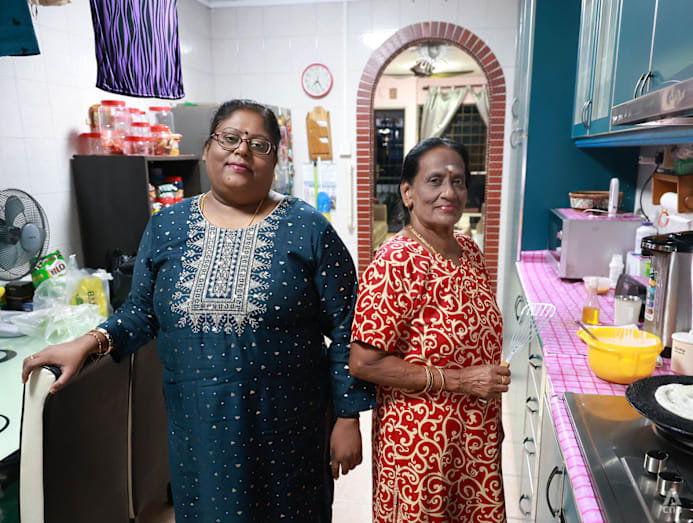
Other caregivers also wanted more respite programmes, or job-matching services for those who wish to return to the workforce but may need more flexible hours.
Apart from workplace and government support, a lifeline for working caregivers has been the peer support networks, people who know first-hand the struggles of balancing caregiving with professional life.
For Mr Lee whose son has cerebral palsy, one important source of encouragement has been Club Rainbow, a charity that supports and empowers children with chronic illnesses and their families.
Outings and respite activities by the charity have provided his family with precious opportunities to spend time together while accommodating his son's needs.
Mr Anand said that one game-changer in caring for his son with an intellectual disability has been informal WhatsApp chat groups for caregivers, where they exchange advice when problems arise.
"Because my son's muscles are getting a bit tight, I asked if anybody knew someone who can do one-to-one yoga or pilates stretching in the house. Within the day, I got about four or five options."
His advice to other working caregivers: Reach out for support.
"You're not alone in this stress. Yes, your stress is yours and that's unique to you, but many of us have travelled this in many different ways ... It's not your own burden to bear (by yourself)."
For Ms Ang, the "sandwiched" caregiver, being an "open book" and making known her caregiving responsibilities has helped her garner support from colleagues and friends.
She does not believe that being a caregiver limits her personal or professional life. Instead, she doggedly continues to make time for her own interests, including toastmasters competitions, volunteering and pottery.
"For me, working is a part of my leisure. I still go out with my friends," she said.
"I'm quite blessed and I'm also very positive, because I talk about it and it makes me less lonely. These are the things that keep us going."
HOW CAREGIVERS ARE SUPPORTED
Mindfull Community, Caring SG, SG Enable and other organisations offer programmes and support for caregivers and employers.
1. Respite and peer connection
- Mindfull Community has a Caregivers-to-Caregivers Education Programme with fully-funded courses for caregivers of persons with mental health conditions or dementia
- Its Respite & Resilience Programme, which can be a full-day or overnight programme, gives caregivers a space to recharge and connect with peers
- The Take-A-Break Respite Programme by disability charity SPD provides subsidised respite care, giving caregivers temporary relief from their caregiving responsibilities
2. Bringing support into the workplace
- The Caregiver-to-Be programme by Mindfull Community brings caregiver training and awareness directly into workplaces with the aim to encourage a more supportive workplace culture, allowing caregivers to share experiences and access resources during office hours
- CaringSG partners with employers to provide disability awareness and self-care workshops, and has adapted its programmes to hold them in the evenings, on weekends and during lunch breaks. Digital options include webinars, WhatsApp groups and virtual befriending
3. Funding for initiatives and courses
- SG Enable's Caregiver Empowerment Fund provides funding of up to S$5,000 for ground-up initiatives by caregiver groups or individuals to empower and support other caregivers who look after people with disabilities
- The Caregivers Training Grant by the Agency for Integrated Care subsidises training courses to help caregivers better support both their care recipients and themselves














